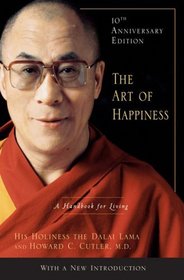Patty R. reviewed The Art of Happiness: A Handbook for Living (10th Anniversary Edition) on + 96 more book reviews
Helpful Score: 1
Amazon.com
Have you ever wondered what it would be like to sit down with the Dalai Lama and really press him about life's persistent questions? Why are so many people unhappy? How can I abjure loneliness? How can we reduce conflict? Is romantic love true love? Why do we suffer? How should we deal with unfairness and anger? How do you handle the death of a loved one? These are the conundrums that psychiatrist Howard Cutler poses to the Dalai Lama during an extended period of interviews in The Art of Happiness: A Handbook for Living.
At first, the Dalai Lama's answers seem simplistic, like a surface reading of Robert Fulghum: Ask yourself if you really need something; our enemies can be our teachers; compassion brings peace of mind. Cutler pushes: But some people do seem happy with lots of possessions; but "suffering is life" is so pessimistic; but going to extremes provides the zest in life; but what if I don't believe in karma? As the Dalai Lama's responses become more involved, a coherent philosophy takes shape. Cutler then develops the Dalai Lama's answers in the context of scientific studies and cases from his own practice, substantiating and elaborating on what he finds to be a revolutionary psychology. Like any art, the art of happiness requires study and practice--and the talent for it, the Dalai Lama assures us, is in our nature. --Brian Bruya
Have you ever wondered what it would be like to sit down with the Dalai Lama and really press him about life's persistent questions? Why are so many people unhappy? How can I abjure loneliness? How can we reduce conflict? Is romantic love true love? Why do we suffer? How should we deal with unfairness and anger? How do you handle the death of a loved one? These are the conundrums that psychiatrist Howard Cutler poses to the Dalai Lama during an extended period of interviews in The Art of Happiness: A Handbook for Living.
At first, the Dalai Lama's answers seem simplistic, like a surface reading of Robert Fulghum: Ask yourself if you really need something; our enemies can be our teachers; compassion brings peace of mind. Cutler pushes: But some people do seem happy with lots of possessions; but "suffering is life" is so pessimistic; but going to extremes provides the zest in life; but what if I don't believe in karma? As the Dalai Lama's responses become more involved, a coherent philosophy takes shape. Cutler then develops the Dalai Lama's answers in the context of scientific studies and cases from his own practice, substantiating and elaborating on what he finds to be a revolutionary psychology. Like any art, the art of happiness requires study and practice--and the talent for it, the Dalai Lama assures us, is in our nature. --Brian Bruya





![header=[] body=[Get a free book credit right now by joining the club and listing 5 books you have and are willing to share with other members!] Help icon](/images/question.gif?v=90afaeb39)
